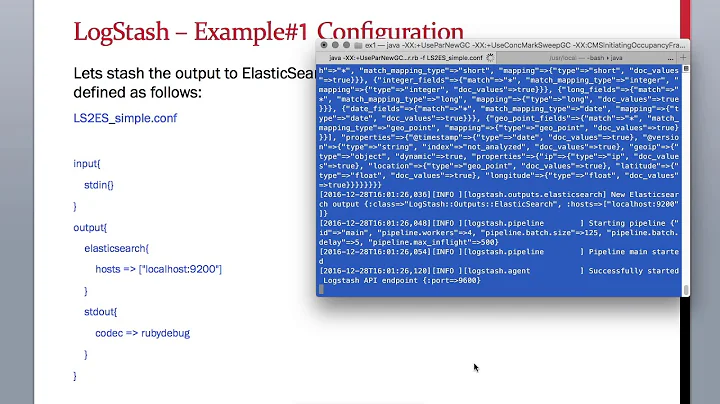How should I use sql_last_value in logstash?
Solution 1
If you have a timestamp column in your table (e.g. last_updated), you should preferably use it instead of the ID one. So that when a record gets updated, you modify that timestamp as well and the jdbc input plugin will pick up the record (i.e. the ID column won't change its value and the updated record won't get picked up)
input {
jdbc {
jdbc_connection_string => "jdbc:mysql://hostmachine:3306/db"
jdbc_user => "root"
jdbc_password => "root"
jdbc_validate_connection => true
jdbc_driver_library => "/path/mysql_jar/mysql-connector-java-5.1.39-bin.jar"
jdbc_driver_class => "com.mysql.jdbc.Driver"
jdbc_paging_enabled => "true"
jdbc_page_size => "50000"
schedule => "* * * * *"
statement => "SELECT * from mytable where last_updated > :sql_last_value"
}
}
If you decide to stay with the ID column nonetheless, you should delete the $HOME/.logstash_jdbc_last_run file and try again.
Solution 2
There are a few things to take care of:
-
If you have run Logstash earlier without the schedule, then before running Logstash with schedule, delete the file:
$HOME/.logstash_jdbc_last_runIn Windows, this file is found at:
C:\Users\<Username>\.logstash_jdbc_last_run The "statement =>" in Logstash config should have "order by" the tracking_column.
tracking_column should be given correctly.
Here is an example of the Logstash config file:
input {
jdbc {
# MySQL DB jdbc connection string to our database, softwaredevelopercentral
jdbc_connection_string => "jdbc:mysql://localhost:3306/softwaredevelopercentral?autoReconnect=true&useSSL=false"
# The user we wish to execute our statement as
jdbc_user => "root"
# The user password
jdbc_password => ""
# The path to our downloaded jdbc driver
jdbc_driver_library => "D:\Programs\MySQLJava\mysql-connector-java-6.0.6.jar"
# The name of the driver class for MySQL DB
jdbc_driver_class => "com.mysql.cj.jdbc.Driver"
# our query
schedule => "* * * * *"
statement => "SELECT * FROM student WHERE studentid > :sql_last_value order by studentid"
use_column_value => true
tracking_column => "studentid"
}
}
output {
stdout { codec => json_lines }
elasticsearch {
hosts => ["localhost:9200"]
index => "students"
document_type => "student"
document_id => "%{studentid}"
}
}
To see a working example of the same you can check my blog post: http://softwaredevelopercentral.blogspot.com/2017/10/elasticsearch-logstash-kibana-tutorial.html
Solution 3
In simple words, sql_last_value allows you to persist data from your last sql run as its name sugets.
This value is specially useful when you schedule your query. But why ... ?
Because you can create your sql statement condition based on the value stored in sql_last_value and avoid to retrieve rows that were already ingested for your logstash input or updated after last pipeline execution.
Things to keep in mind when using sql_last_value
- By default, this variable stores a timestamp of last run. Useful when you need to ingest data based in columns like
creation_datelast_updateetc.. - You can define the value of
sql_last_valueby tracking it with a specific table's column value. Useful when you need to ingest auto increment data based. For that, you need to specifyuse_column_value => trueandtracking_column => "column_name_to_track".
The following example will store the last mytable row's id into :sql_last_value to ingest in the next execution the rows that were not ingested previously, it means the rows which its id is greater than the last ingested id.
input {
jdbc {
# ...
schedule => "* * * * *"
statement => "SELECT * from mytable where id > :sql_last_value"
use_column_value => true
tracking_column => id
}
}
Extremely important !!!
When you use multiple inputs in your pipeline, each input block will overwrite the value of sql_last_value of the last one. For avoiding that behaviour, you can use last_run_metadata_path => "/path/to/sql_last_value/of_your_pipeline.yml" option, which means that each pipepline will stores its own value in a different file.
Related videos on Youtube
Comments
-
 Kulasangar almost 2 years
Kulasangar almost 2 yearsI'm quite unclear of what
sql_last_valuedoes when I give my statement as such:statement => "SELECT * from mytable where id > :sql_last_value"I can slightly understand the reason behind using it, where it doesn't browse through the whole db table in order to update fields instead it only updates the records which were added newly. Correct me if I'm wrong.
So what I'm trying to do is, creating the index using
logstashas such:input { jdbc { jdbc_connection_string => "jdbc:mysql://hostmachine:3306/db" jdbc_user => "root" jdbc_password => "root" jdbc_validate_connection => true jdbc_driver_library => "/path/mysql_jar/mysql-connector-java-5.1.39-bin.jar" jdbc_driver_class => "com.mysql.jdbc.Driver" schedule => "* * * * *" statement => "SELECT * from mytable where id > :sql_last_value" use_column_value => true tracking_column => id jdbc_paging_enabled => "true" jdbc_page_size => "50000" } } output { elasticsearch { #protocol => http index => "myindex" document_type => "message_logs" document_id => "%{id}" action => index hosts => ["http://myhostmachine:9402"] } }Once I do this, the docs aren't getting uploaded at all to the index. Where am I going wrong?
Any help could be appreciated.
-
 Val over 7 yearsDo you have a timestamp column in your table that gets updated on each record update?
Val over 7 yearsDo you have a timestamp column in your table that gets updated on each record update?
-
-
 Kulasangar over 7 yearsI added a
Kulasangar over 7 yearsI added avarchartimestamp column where I've inserted values manually for testing purposes as such (2016-09-01 00:00:00) to my table and tried creating the index, but still none of the records are getting uploaded to the index. I deletedlogstash_jdbc_last_runas well. -
 Val over 7 yearsthe timestamp column should not be a varchar one, but a timestamp one or date or date_time
Val over 7 yearsthe timestamp column should not be a varchar one, but a timestamp one or date or date_time -
 Kulasangar over 7 yearsI recreated the scenario with a datetime type column. The value can be like this (ie: 2016-09-01 00:00:00) right? Still the docs aren't getting uploaded to the index. I could provide the logstash conf and the index docs count output.
Kulasangar over 7 yearsI recreated the scenario with a datetime type column. The value can be like this (ie: 2016-09-01 00:00:00) right? Still the docs aren't getting uploaded to the index. I could provide the logstash conf and the index docs count output. -
 Val over 7 yearscan you run logstash with the
Val over 7 yearscan you run logstash with the--debugcommand line switch ? -
 Kulasangar over 7 yearsYup sure, you want me to show you the output in the console? Part of the output looks like this pastebin.com/5XnSx2Za
Kulasangar over 7 yearsYup sure, you want me to show you the output in the console? Part of the output looks like this pastebin.com/5XnSx2Za -
 Val over 7 yearsAs you can see the query that is ran is
Val over 7 yearsAs you can see the query that is ran isSELECT count(*) AS count FROM (SELECT * from TEST where time > '2016-11-01 17:45:18') AS t1 LIMIT 1so your timestamps need to be bigger than2016-11-01 17:45:18 -
 Kulasangar over 7 yearsLet us continue this discussion in chat.
Kulasangar over 7 yearsLet us continue this discussion in chat. -
frank17 over 2 years@Val and what if I use
statement_filepathand have myquery.sqlin separate file? Where do I use> :sql_last_value? In thequery.sqlor withinjdbc input? -
 Val over 2 years@frank17 please ask a new question to highlight your case, it'll get much more attention than in a comment. Thanks
Val over 2 years@frank17 please ask a new question to highlight your case, it'll get much more attention than in a comment. Thanks









